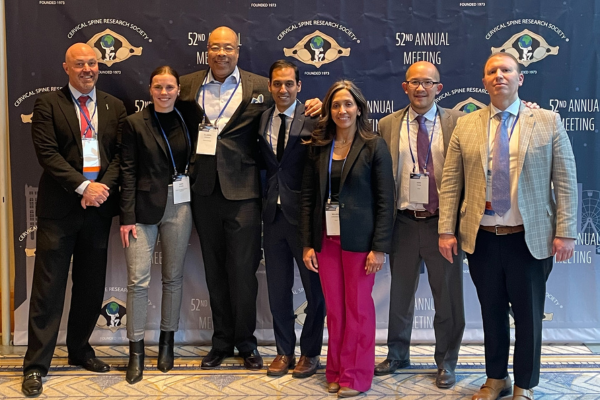
This week, Chicago hosted the prestigious Cervical Spine Research Society (CSRS) Annual Meeting, bringing together a global community of orthopaedic and neurosurgical physicians, residents, and fellows. The event was a dynamic platform for presenting cutting-edge research, fostering meaningful discussions, and exchanging ideas on diagnosing and treating cervical spine injuries and diseases.
The CSRS meeting is renowned for promoting high-quality research and elevating the standard of care in the cervical spine field. Focusing on advancing clinical practices and scientific understanding, this year’s gathering offered invaluable opportunities for professionals worldwide to collaborate and learn from one another.
Duke Orthopaedic Faculty at the CSRS Meeting
Duke Orthopaedic faculty members were well-represented at the event, contributing their expertise to the ongoing dialogue on cervical spine care. The Duke team in attendance included Dr. Douglas Orndorff, Dr. Dana Rowe, Dr. Olumide Danisa, Dr. Deb Bhowmick, Dr. Melissa Erickson, Dr. Khoi Than, and Dr. Peter Passias. Each brought unique perspectives to the table, particularly emphasizing improving patient outcomes through innovative techniques and collaborative research.
Dr. Christopher Shaffrey, professor and Spine Division Chief at Duke Orthopaedics and president-elect of the Cervical Spine Research Society, was particularly noteworthy. His leadership role within the CSRS underscores Duke’s commitment to advancing the field and supporting multidisciplinary approaches to cervical spine care.
The CSRS: A Hub for Innovation and Collaboration
The CSRS is a distinguished multidisciplinary organization composed of experts dedicated to the clinical and research challenges of the cervical spine. Established as a forum for discussing best practices, novel approaches, and evolving theories in diagnosing and treating cervical spine injury and disease, the society encourages rigorous scientific principles while fostering collegial interaction among its members.
This year's meeting highlighted the growing importance of collaborative research. It focused on how advancements in surgical techniques, imaging technology, and patient care strategies shape the future of cervical spine treatment. Discussions centered on both standard and complex cervical spine conditions, such as degenerative disc disease, spinal cord injury, and cervical deformity, with an emphasis on individualized, patient-centered care.
Looking Ahead: The Future of Cervical Spine Care
As the CSRS looks to the future, its emphasis on rigorous scientific inquiry and collegial collaboration will continue to drive advancements in cervical spine care. The ongoing contributions of Duke Orthopaedic faculty members, including Dr. Shaffrey’s leadership, will play an integral role in shaping the direction of the field.